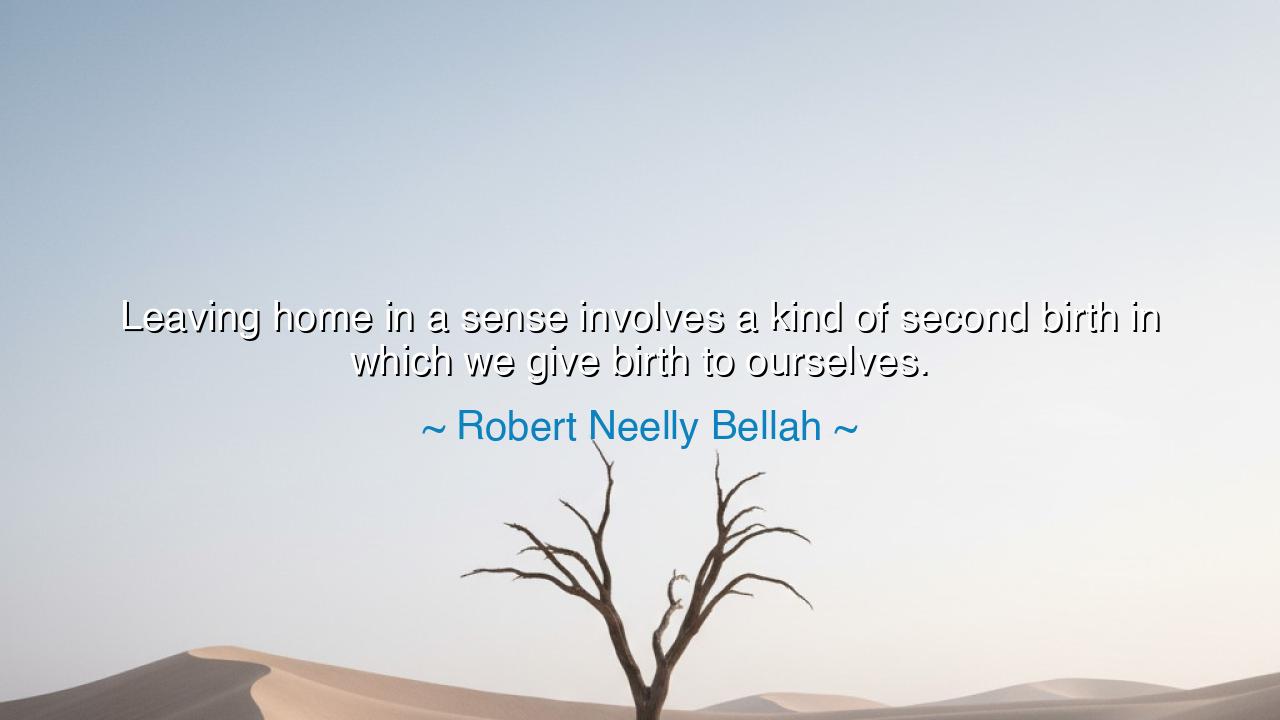
Leaving home in a sense involves a kind of second birth in which
Leaving home in a sense involves a kind of second birth in which we give birth to ourselves.






The philosopher and sociologist Robert Neelly Bellah once wrote: “Leaving home in a sense involves a kind of second birth in which we give birth to ourselves.” In these words, there lies a profound and timeless truth about the journey of the human spirit — that growth requires departure, and that to truly live, one must at some point step beyond the comfort of origin. Bellah, a thinker of deep moral insight, reminds us that the act of leaving home is not only a physical journey but a spiritual transformation — a rebirth, where we become both parent and child to our own emerging identity.
From the ancient world to our own, every soul that has sought wisdom or greatness has known this truth. The ancients told stories of heroes who could not remain in their father’s house forever. Odysseus left Ithaca to seek glory across the seas; Siddhartha left his palace to seek enlightenment under the Bodhi tree; Moses left the luxury of Egypt to lead his people toward freedom. In each story, departure is not betrayal — it is destiny. For home, though sacred, is only the beginning. It shelters the seed, but the seed must break the soil to find the sun. Bellah’s words, like an echo from the ages, remind us that to leave home is to be born again, to shed the shell of childhood and forge the self anew.
When Bellah speaks of a “second birth,” he does not mean a rejection of where we came from, but rather an awakening to who we are meant to become. The first birth gives us life; the second gives us meaning. The first brings us into the world; the second brings the world into us. In this second birth, we are no longer shaped by others’ expectations, but by our own purpose. To “give birth to ourselves” is an act of courage, for it requires facing the unknown, enduring pain, and choosing growth over comfort. Just as the newborn leaves the safety of the womb, so too must the soul step beyond the familiar if it is to truly live.
This truth can be seen not only in myths, but in the real lives of those who dared to walk away from the known. Consider Abraham Lincoln, born in a log cabin in Kentucky, who left his humble beginnings to educate himself, to rise from obscurity, and to guide a fractured nation through its darkest night. His journey was not easy — he bore loneliness, loss, and struggle — but through these trials, he gave birth to himself, becoming not merely the product of his past, but the author of his destiny. Like Bellah’s vision, Lincoln’s life shows that leaving home is not abandonment — it is the sacred labor through which the soul becomes its own creation.
The origin of Bellah’s quote comes from his exploration of modern identity, community, and moral responsibility. In his writings, he observed how the modern individual must find meaning in a world no longer bound by tradition alone. To leave home, then, is symbolic of leaving inherited structures — family, culture, belief — and stepping into the responsibility of one’s own becoming. Yet Bellah, ever the moral thinker, did not advocate aimless rebellion. He saw this second birth as a creative act, a way to carry the best of our roots into the new soil of personal freedom. Thus, leaving home is not a rejection of where we came from, but a continuation of it — a rebirth that honors the first birth by transforming it.
In the rhythm of life, this “second birth” comes to all who truly live. It arrives when we leave the home of our youth, when we step out of dependence into choice, when we confront the weight of our own decisions. It comes in many forms — when we move to a new land, when we change a belief, when we dare to live by our own light. And each time, we are both the midwife and the infant — the one who labors and the one who emerges. The process is painful, yet sacred. For in that pain, we find our strength; in that uncertainty, we find our truth.
The lesson, then, is this: do not fear leaving home, for to stay forever within its walls is to never truly be born. Home is the first blessing, but it is not the final one. Carry its warmth in your heart, but let your feet wander, your spirit question, your hands create. To give birth to yourself is to take responsibility for your existence — to shape your soul as the artist shapes his clay. Seek not a life of ease, but a life of becoming. For every time you step into the unknown, you awaken a deeper self — and with each awakening, the world itself grows larger, richer, and more alive within you.
Thus, as Robert Neelly Bellah teaches, the act of leaving home is the oldest ritual of transformation. It is how the child becomes the adult, how the dreamer becomes the doer, and how the human becomes the fully awakened soul. So when the moment comes for you to step beyond the threshold — whether of your home, your past, or your fear — remember this: you are not leaving something behind; you are becoming something new. And in that sacred becoming, you will find the truest home of all — the one you build within yourself.






AAdministratorAdministrator
Welcome, honored guests. Please leave a comment, we will respond soon